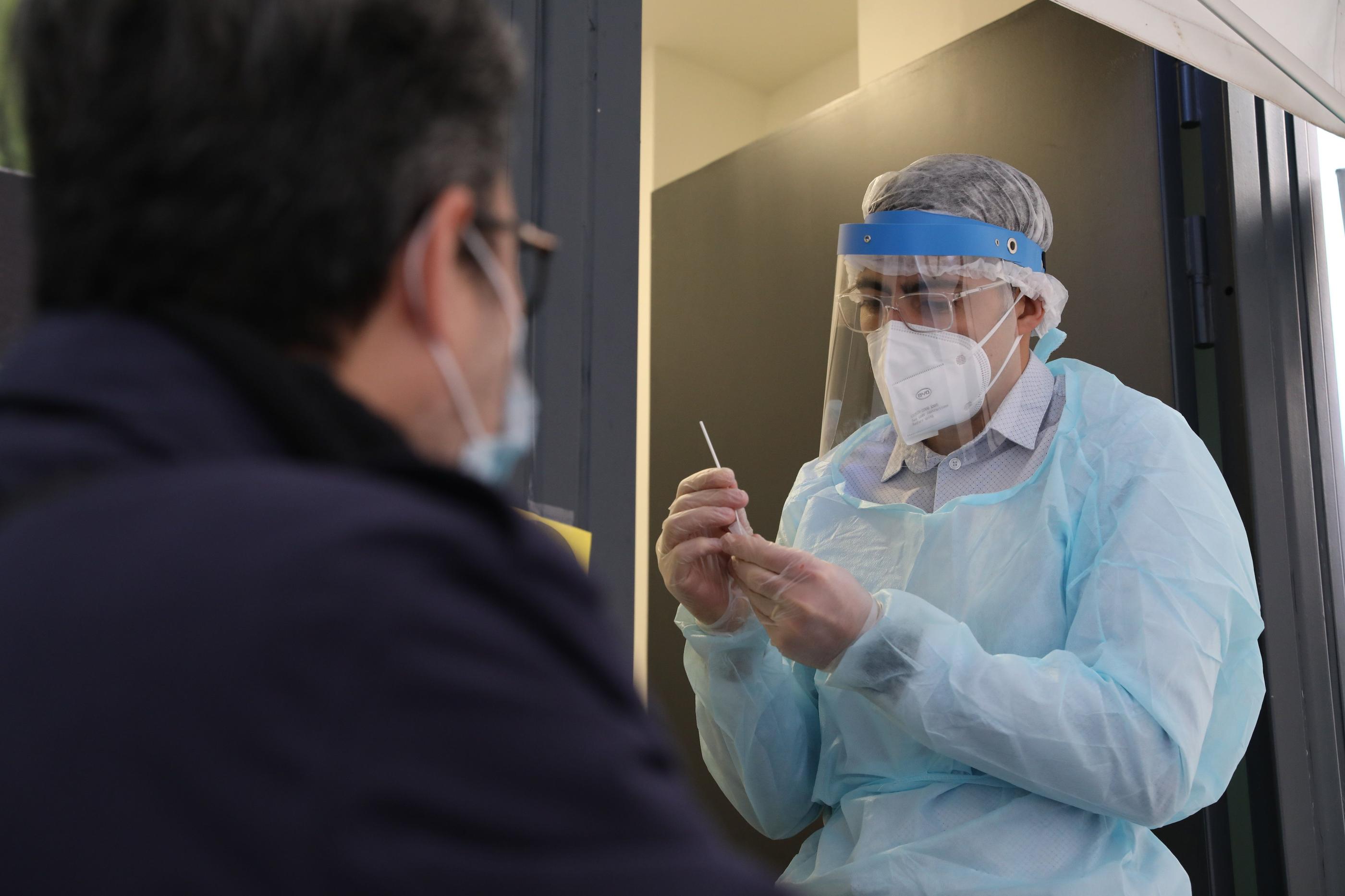Uzlac, a Croatian in his fifties with silver hair and a neat braid, is tested for Covid-19, in front of a pharmacy in Courbevoie (Hauts-de-Seine).
"I have to go to Croatia and the antigen test is enough there
(Editor's note: most ask for PCR tests done in the laboratory).
, he breathes with a slight Slavic accent. If I had symptoms I would do a PCR test instead, it's safer. There, it is much faster. Cyrus, the sampler, is a young student in a physiotherapy school and has been holding this kind of stand in various establishments in the Ile-de-France for almost two months. "Attendance is very variable, I perform between 6 and 60 tests per day," he explains. It went down with the confinement. But I have positive cases every day. It is still very useful, because it goes quickly and it allows you to get an idea. "
The proportion of antigenic tests is stable, around 30% of screenings carried out (around 100,000 out of 340,000 on average over the past week). These data include the tests (all free) by nasopharyngeal swab performed in pharmacies or in screening centers set up in municipalities or schools, but not saliva tests, which are analyzed with a PCR technique. Self-tests (paying around 6 euros), antigenic and carried out at home, do not include these statistics either, but remain fairly confidential.
The main strength of antigenic tests is their almost instantaneous (15 minutes), but this interest has diminished since more than 90% of the results of PCR tests are returned in less than 24 hours and most often in less than 12 hours. The local network also facilitates access, without an appointment. These tests cost less to the Health Insurance than the PCRs (up to 54 euros per unit), but still 28.99 euros per unit (excluding self-tests), for an uncertain result. Because the major drawback is the lower reliability. According to a recent report from the High Authority for Health, two out of ten positive cases that would have been detected with a PCR test pass through the cracks with an antigen, in symptomatic people. Worst,one in two positive cars brought to light by a PCR test would pass through in asymptomatic patients, patients who have no symptoms, having their nose swabbed at the pharmacy.
Only a positive antigen test is 99 or 100% reliable
“The difficulty in asymptomatic people is to date the onset of infection,” explains Anne-Claude Crémieux, infectious disease specialist at Saint-Louis hospital (Paris).
The sensitivity of 50% is explained by the fact that these tests are difficult in the two days before the peak of the infection and from four days after, when the viral load is lower.
It should be noted that these studies relate to samples taken by or under the control of professionals and that the poor performance of a self-test could further reduce its effectiveness.
These doubts about reliability sometimes lead to difficult situations to manage, illustrated even on the self-test instructions: “A negative result in an asymptomatic person does not exclude a Covid-19 infection. In the presence of suggestive symptoms, a negative result should be checked by a laboratory test. In other words, only a positive antigenic test is reliable "at 99 or 100%", according to the HAS. This did not prevent certain defective batches from leading to cascades of false positives. A rarity. Another problem is that antigenic tests do not allow the screening of variants, and a new PCR sample must then be taken ...
“The risk [in terms of an epidemic] is to do the antigen test too early and to be reassured when in reality you are in the midst of contagion 48 hours later, continues Professor Crémieux.
This is what led an American to infect 20 people during a family celebration.
When you really want to be sure, for example when you are admitted to a hospital where you cannot afford the slightest doubt, you perform a PCR test.
But the strategy can be based on several types of tests, provided you understand their limits.
"
"Useful at school or in closed communities"
Thus, the antigenic tests must be used very close to a contact with a person at risk or in a repeated manner: “By carrying out two tests per week, one cannot in principle miss an infection. This can be very useful for example at school or in closed communities. If you are due to meet your grandmother two hours later and your test is negative, it means that your viral load is low [even during an incubation period] and the risks are reduced. This is the strategy that is implemented on tests for large gatherings such as concerts. On the other hand, three days before, it is useless. "
Whatever the result, you must also take into account your state of health without blindly trusting the test. "In practice, I do not recommend the antigen test to my patients," explains Serena Iskounen, general practitioner in Courbevoie. There is like a pressure, we do it all the time. The concern is that patients rely solely on the result, without having the related clinical knowledge. I also saw negative PCR tests on several occasions, despite symptoms, and people who infected relatives before finally having a positive test. In the event of symptoms compatible with a Covid, I recommend isolation above all. "

